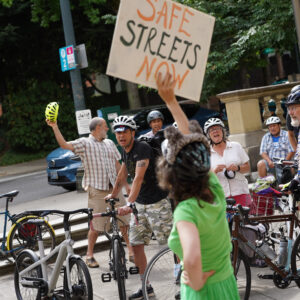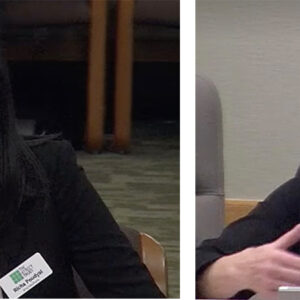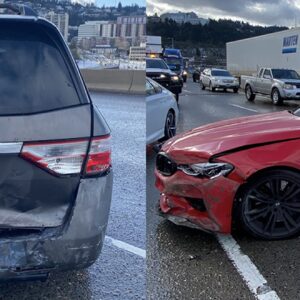
Portlander Lois Leveen has published an opinion piece in The Oregonian that calls on local officials to get serious about what she feels is the root cause of our traffic safety crisis: drivers of motor vehicles.
“I love living in Portland. But I’m fed up with having my safety threatened every time I leave my home,” Leveen writes in an op-ed published Sunday.
Leveen is an author and health humanities expert who’s no stranger to elevating her voice for safe streets advocacy. You might recall her participation in the counter protest to Commissioner Mingus Mapps’ press conference back in August. At that event, in the plaza outside City Hall, Leveen repeatedly shouted down Mapps and other speakers.
Her opinion piece attempts to make the case that the real danger on our roads is not just drivers of cars, but the cars themselves. “Pedestrians and bicyclists are often perceived as those most vulnerable to death or injury at the hands of motorists, leading people to believe they are safest in a motor vehicle. Yet 32 of this year’s 49 deaths have been motor vehicle drivers or passengers,” Leveen writes.
As a remedy to what she refers to as, “vehicular violence,” Leveen says transportation leaders and elected officials should work together to ban right turns on red, create a citywide 20 mph speed limit, prohibit car parking at intersections to improve visibility, and use more automated enforcement cameras.
“If Portland is able to reconfigure streets to increase restaurants’ revenue with on-street dining spaces, surely we can reconfigure them to ensure public safety,” Leveen writes in the final sentence. Read the full opinion piece on The Oregonian’s website.





Thanks for reading.
BikePortland has served this community with independent community journalism since 2005. We rely on subscriptions from readers like you to survive. Your financial support is vital in keeping this valuable resource alive and well.
Please subscribe today to strengthen and expand our work.
Here is proof that one can be clear, direct, and eloquent all at the same time. Thank you, Ms. Leveen!
I really like her 4-point plan. Succinct and simple and very hard to argue against. Whenever I ride Interstate I wonder why that street escaped the recent change of Portland streets to 20 mph.
Thanks for the shout-out! If folks want to keep attention on this issue for audiences beyond BikePortland, please send consider submitting a letter to the editor to the Oregonian. Letters that are succinct, reference the original Opinion piece, and build on it in some way are most likely to get printed. And even those letters that don’t get printed will help the Oregonian editors to understand how pressing this issue is for Portlanders. So let’s keep that focus up!
(Also, point of clarification: I am not officially affiliated with BikeLoud PDX. I have voiced some substantial concerns about equity, most notably about how women are misrepresented, in BikeLoud PDX communications, and until those concerns are addressed and BikeLoud makes a commitment to ongoing equity work, I do not wish to be part of the organization. Good intentions are not enough when harmful practices persist. I realize a recent BikeLoud PDX newsletter erroneously implied that the arrival of bicyclists at the August press conference held by PBOT — which I instigated — was a BikeLoud event, but that wasn’t the case. I had previously made it clear to BikeLoud PDX’s leader that his dismissal of my equity concerns made it impossible for me to be part of the organization, and yet he composed that newsletter item in ways that seemed to give BikeLoud credit for a far more grassroots event.)
Oh dear. It’s so difficult to keep everyone focused on the same goal and unified to achieve that goal.
keep up the good work, Lois!
Women in general seem to tend to get completely ignored in the cycling infrastructure discussions in Portland. I applaud your decision to shine a spotlight on that. The decisions to highlight the opinions of the MAMILs advocating for the status quo when there were discussions about adding bike lanes on Skyline whilst completely ignoring the voices of women and minorities saying we need them will forever be a sore spot for me. Far from the only time I’ve seen that pattern too.
There’s always talk about “gee, why don’t more women ride” while this rather significant factor is consistently ignored. Oddly enough there tends to be a correlation. The cycling community seriously needs to address its rampant sexism problem.
Lois,
I couldn’t agree more to your statements to the Oregonian, and have nothing but admiration for your ability to raise your voice to elevate this conversation, and I really respect what you wrote
Which makes having to say the next few things harder. I hesitated to even respond, but I had multiple folks personally ask me about your comment and tell me you’ve been talking very disparagingly about BikeLoud and me personally behind my back at BP and even BikeLoud events. I also believe remaining transparent and honest is key for everyone, including BP readers:
At the end of the day: are there decisions I made that I would have done differently given another chance? Of course. I’ll also be the first to admit I made mistakes, which I did. But talking disparagingly about this organization that hundreds of people pour their heart and soul into and defaming me personally in the process is another thing.
In this moment we must ultimately see the forest for the trees: we are facing a climate crisis, a housing crisis, a road safety crisis, and many other issues culminating in our current generation’s problems. This is way more than just Lois or Nic. We are all people caught up in trying to do something about it. This fight is much bigger than you or me and will need us working together to make the differences we strive for. I hope you can come to agree and that anger is best reserved for the real changemakers and people in power, not the fellow volunteer advocates working to make a difference.
I have suggested to Nic, and to other folks involved in BikeLoud, that the organization needs to commit with urgency, openness, and humility to centering equity in its work. This includes adapting an equity framework that guides all decision making and communications, and acknowledging that working on equity and inclusion is an ongoing commitment for all organizations. I am not interested in going back-and-forth with Nic here or anywhere else about how his inability to understand this or to listen to other people’s perspectives impedes BikeLoud’s effectiveness. As I have told a variety of BikeLoud board members and volunteers, my commitment to equity and inclusion makes me unable to work with organizations that do not share that commitment, in meaningful ways. I wish I could imbue BikeLoud with the willingness to do the work needed to be an equitable and inclusive organization, and I am certainly available to help with this work, but it is difficult enough to do real equity and inclusion work when leadership are committed to it. It is impossible to do when they are not.
I’m not sure anyone who has to commute or shops for the family would agree. Is there a broader neighborhood effort on common issues?
“…create a citywide 20 mph speed limit…”
We could have a citywide 5 mph speed limit but without enforcement it is meaningless.
I’d say start with actually enforcing the speed limits we already have (and are routinely ignored).
We certainly need better enforcement of existing speed limits (a point I make in the Oregonian piece). But having uniform speed limits would help drivers comply. If I drive around my block — just one square block — I am expected to comply with three different speed limits, without signs posted on each of the blocks where the speed limit changes. Who could expect drivers to know and adjust their speed THREE times around one block? And of course the larger issue is that if exceeding 20 mph is unsafe on the part of the block where I live, how could it possibly be true that driving 25% or 50% faster on the adjacent or parallel parts of the same square block where other people live, and where pedestrians have to cross to get to a bus stop, the library, or make their way to school or to stores is not dangerous? Regulating unsafe speed needs to be a multi-pronged and consistent effort, with enforcement as one piece (notably, the head of traffic enforcement for Portland police openly states that because so many people speed the police cannot slow traffic, which may or may not be true; either way, it provides as good a case as any for installing more automated traffic ticketing that is not handled at all by the police, as the County report recommends).
People say it’s meaningless, but it isn’t. When some people go the speed limit, it makes it hard for the people behind to go faster. Yeah, some will, but when the speed limit is 30, almost everyone is going to be driving 30+, and the same speeders are going to be trying to go faster than that.
People have this baffling all-or-nothing attitude towards any change. Some people speed? Speed limits are worthless! Plastic bollards can be run over? Plastic bollards are useless. It’s nonsense and the people repeating it are being dishonest or not thinking very carefully about what they’re saying.
Yes, automated enforcement would help as well, but we can change the speed limit and change enforcement in parallel. They’re not dependent on each other, except enforcement is useless if the speed limit is 30 (and won’t ticket anyone going under 41).
Leveen unfortunately glosses over what is needed to make Portland streets safer:
CONSEQUENCES
Portland desperately needs to apply the Deterrence Theory to our record traffic violence:
Deterrence Theory implies that there are three things that dater people from illegal behavior:
1) Certainty of Getting Caught
2) Swiftness (Celerity) of the Enforcement
3) Severity of the Punishment
This definition of deterrence focuses only on the choices made by individual drivers; but there is plenty of evidence that policy and design can affect drivers’ behavior. I’m not disagreeing about the lack of enforcement being a problem, but calling for consequences for individual drivers should not absolve political leaders from also doing everything in their power to make our streets safer for everyone (bicyclists, pedestrians, and motor vehicle drivers and passengers).
Genealogically, Deterrence Theory in criminology is an offshoot of Just War Theory. It’s telling that you see the conflict on our streets as one of war, where there are clearly defined belligerents on each side, presumably law abiding citizens vs scofflaws. If, as Lois makes the case, the problem is traffic violence, then is it ironic to prescribe going to war to end violence?
Dangerous driving is not an act of war, and I don’t think anyone suggested it was.
I won’t argue for or against anything you wrote, except that introducing the word “celerity” seems pointlessly redundant considering it’s an archaic word that humans have replaced with that put before it, “swiftness”.
I don’t think there’s any amount of law enforcement (“consequences”) in a city of over half a million people that alone can make our unsafe streets safe.
IMO banning right on red and universal 20mph limits are both impractical and not necessarily productive. However I do think that being more aggressive with lowering speed limits and limiting right on red in problem spots would be beneficial. For example Cornell rd ranges from 40-45mph in front of 2 elementary schools (French American and Cedar Mill) near me. In what has become a well populated residential area. Fine example of an inappropriate limit, it should be lowered to 35mph at most. Right on red is harmless and highly beneficial at corners without much pedestrian and cyclist traffic, yet should probably face more restrictions in places with lots of use like that or bad sight lines.
The other 2 suggestions I firmly support and think should be done without delay.
Click the link in the Opinion piece for actual data disproving the claim that “right on red is harmless and highly beneficial.” And see comments above on why having speed limits that vary from one block to another or from one section of a street to another actually makes compliance with speed limits more difficult.
It’s interesting how Portlanders like Leveen push traffic cameras over police traffic enforcement as some sort of beautiful racially neutral enforcement yet it’s been shown that traffic cameras are racist. Maybe we just need to accept that we need enforcement (including robust police traffic enforcement), that it won’t be perfect and drop the police hate that permeates the bike portland and bikeloudpdx crowd?
https://www.propublica.org/article/chicagos-race-neutral-traffic-cameras-ticket-black-and-latino-drivers-the-most